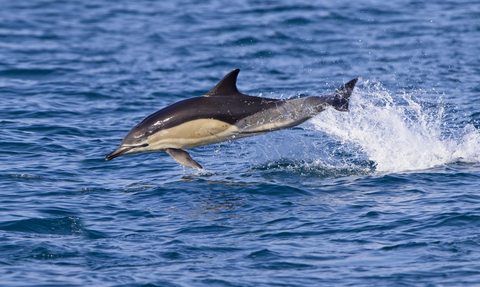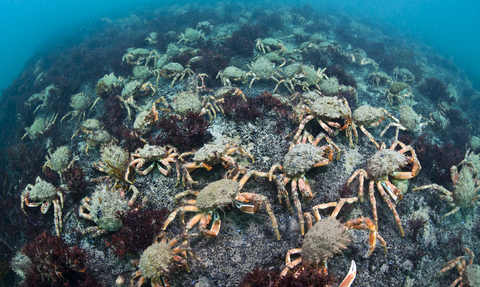
Common Dolphin, Image by Tony Mills (featured in Cornwall Wildlife Trust's 2022 Wild Cornwall Calendar)
Ocean Emergency Fund
Cornwall’s coast is home to some of the richest marine wildlife, from tiny rare colourful corals to bottlenose dolphins and giant basking sharks. However, this diverse marine life urgently needs protecting. Cornwall’s coastal waters face a number of significant pressures – including shipping, development, dredging, and fishing – which threaten our seas and the marine life within them.
Pollution is a very serious threat to marine life in Cornish coastal waters. The ingestion of, or entanglement with, plastic and other non-decomposable waste can cause malnutrition, injury or death to marine animals. In 2019, 80,000kg of rubbish was removed from Cornish beaches, whilst in the same year 104 seals were recorded to have been entangled in litter.
The effects of climate change are also being felt in the seas around Cornwall’s coast. In the last 34 years, Cornwall’s mean temperature has increased by nearly 1ºC, with another 1ºC estimated by 2050. This is leading to a rise in the seas in the South West, with Cornwall’s maritime environment having seen an average of 0.6 ºC increase in average temperatures since the 1940s. Such a rise in temperatures increases acidification, causing species which rely on calcium for their protective structures (such as oysters, scallops and coldwater corals) to suffer or die out. Sea level rises lead to the loss of coastal habitats and wildlife, for example, intertidal habitats and the species they support.
The threat of overfishing
While it is possible for fishing to thrive within a healthy marine ecosystem in Cornwall, overfishing has seriously affected many species found in Cornish waters. In 2020, 69%% of fish landed was recommended as being sustainable according to the Cornwall Good Seafood Guide, which is positive, but there is still a long way to go. In addition, certain fishing practices, such as dredging and bottom trawling, have led to the loss of important habitats and animals. Fishing also causes death and injury to marine mammals and birds: in 2019, over 27% of reported strandings showed signs of bycatch (being caught unintentionally by fishing).
Your donation to the Ocean Emergency Fund will help protect Cornwall’s incredible marine environment. By supporting vital conservation work at sea, you will help reduce the threat to our seas. Each day, Cornwall Wildlife Trust staff and volunteers are working hard to ensure Cornwall’s marine environment thrives. The Ocean Emergency Fund makes core marine projects possible so that we can look to the future with greater hope for Cornwall’s seas, funding a varied range of marine work. We monitor our marine environment, creating awareness of the threats to marine life and campaigning for better protection for our marine species and habitats.
Ruth Williams, Marine Conservation Manager

Mass gathering of spider crabs, Image by Alexander Mustard/2020VISION
Ocean Emergency Fund
The Marine Strandings Network records and monitors marine wildlife strandings, and helps train and support a team of over 150 volunteers. The dedicated Strandings Hotline records all reported strandings on Cornwall’s coastline and this information is vital in helping us to conserve wildlife.
Our Your Shore Network of Local Marine Groups champion ocean conservation in 17 community-led groups across Cornwall. They work together, sharing data, ideas, and resources to present a united voice advocating better protection for our coast. They also run surveys, beach cleans, and train volunteers to take part in Cornwall Wildlife Trust’s citizen science projects, providing evidence of the threats to our valuable marine life and the need for better protection.
Through our Cornwall Good Seafood Guide, we work with the fishing industry to increase sustainable practices, whilst increasing awareness of sustainably sourced fish amongst consumers.



